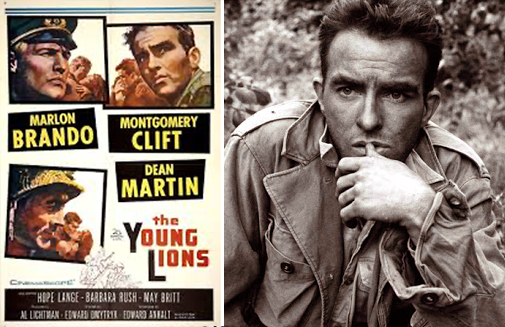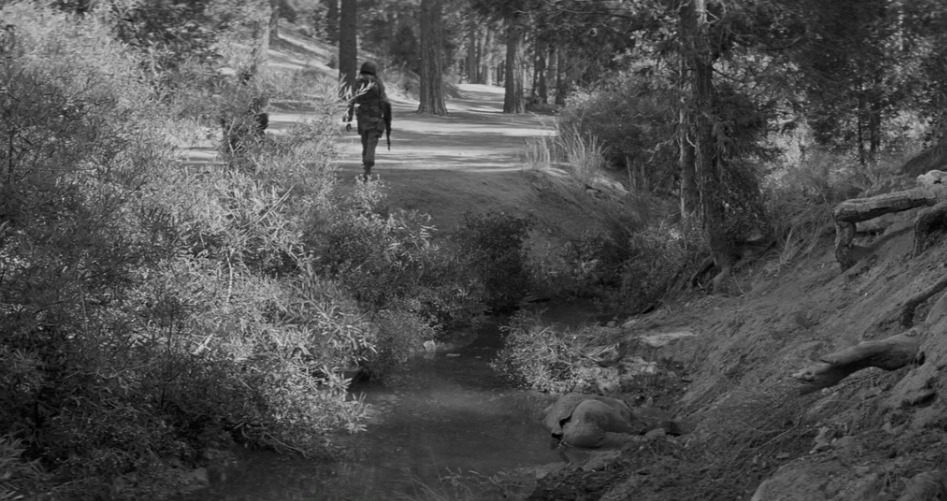by Nathaniel R

Though Montgomery Clift rubbed some early co-stars the wrong way, "difficult" reputations in Hollywood never tell the full story. Clift also had friends in Hollywood and some loyal and famous ones like Liz Taylor who saved his career with a three picture deal (starting with Raintree County). Marlon Brando was another, though their relationship was far more volatile. Brando initially idolized Clift and eventually became his rival for both roles and status as the actor of their generation. Though they had never acted together, they travelled in the same New York artistic circles and became friends (and very briefly lovers) in the 1940s.
Brando was four years younger than Clift and had followed in his footsteps to fame...
 Brando visiting Clift on the set of "From Here to Eternity"
Brando visiting Clift on the set of "From Here to Eternity"
Like Clift, Brando built his reputation on Broadway through multiple plays in the 1940s, ending with A Streetcar Named Desire. He transferred to the silver screen just a couple of years behind Clift, and both had arrived with the same seismic jolt -- big hit + Best Actor Oscar nomination -- right out of the gate. The Young Lions would be the fitting title of a mutual biopic about these two influential then twenty-somethings who changed screen acting forever in the late 40s and early 50s.
But almost a decade later when they finally made a film together, the title doesn't fit. Sometimes art doesn't cooperate with the artist's intentions.

The book "Brando Unzipped" details a conversation the friends and rivals supposedly had before filming, Marlon was excited to work with Monty but upset when he saw him, seeing the toll the addiction and the accident had taken. He said to Monty...
"You've been good for me. You've made me a better actor because I want to be better than you. That makes me work harder. You're my touchstone. My challenge. Ever since I saw A Place in the Sun, I knew you could take the screen from me. But after that, you've just gone downhill. You never lived up to your promise."
Marlon's words angered Monty. "At least I didn't make Guys and Dolls singing and dancing with Sinatra," Monty said.
"Touché!"
The Young Lions is a hangdog World War II picture that introduces us to three future soldiers, none of whom are particularly 'young'.
 that feeling when you realize your ski instructor is a Nazi
that feeling when you realize your ski instructor is a Nazi
We first meet a German ski instructor Christian Diestl (Marlon Brando) just before the war who considers himself apolitical but doesn't mind the Nazis so much. He's trying to bed Margaret (Barbara Rush) and she's playing along until she realizes how deluded he is. He rationalizes all sorts of things about Hitler and only blames "a small handful of fanatics" for how crazy things have gotten (Sound familiar?).
Later across the Ocean when the war has begun we meet Michael Whiteacre (Dean Martin) a Broadway star and self proclaimed "coward" who is actually Margaret's boyfriend. She encourages him to stop trying to avoid war. They befriend a Jewish man named Noah Ackerman (Montgomery Clift) and introduce him to a shiksa (Hope Lange) whom he promptly marries before reporting for war duty.
 tfw when your friend thinks you're a masochist. And maybe you are
tfw when your friend thinks you're a masochist. And maybe you are
Once they're all solidly in the war the service isn't what they expected. Christian continually chafes against the cruelty expected of him, especially by his commander (future Judgment at Nuremberg Oscar winner Maximillian Schell). He just wants to bed women and live in peace. Meanwhile Noah deals with anti-semitism in the U.S. Army but won't stop fighting his own countrymen because he's trying to maintain his dignity and not put up with the abuse. Meanwhile Michael tries to help Noah while also trying to save his own ass from entering the actual battleground. Since it's a manly war picture you can see the individual plot points and character arcs coming with such clarity that you can only feel sorry for soldiers onscreen with the sun in their eyes or otherwise obstructed view as they dodge bullets.
Clift has a few good moments in the film -- his nervousness on his first date with Hope Lange is endearing and he's perfect at selling the double-whammy of exhaustion and persistence of a soldier on survival autopilot in the war scenes. But there's a layer of masochism about the role and the performer combined that's hard to shake. Part of it emerges from the plot point of Noah offering himself up repeatedly for beatings from fellow soldiers. Part of it is Clift trying to sell a younger man than you are when you suddenly look so much older than audiences are used to (One particular awkward scene involves Noah meeting his girlfriend's father -- the scene is ostensibly about low key anti-semitism but instead the father might reasonably be thinking 'what does this middle-age dude want with my young daughter?') Still more of it is the severely diminishing returns of Clift starring in a war picture wherein the hero's biggest battle is with his fellow soldiers which he'd done just five years earlier to astounding success.

All in all The Young Lions is a strangely paced and muddled war picture, filled with very long set-ups to dramas that do and don't happen. The frequent battle sequences, while well-executed, feel especially strange since none of the three soldiers are remotely interested in being a part of them. The latter feeling helps the picture earn its place in the subgenre of war films that are actually anti-war films but it's a mixed bag of a movie. Egypt supposedly banned the film due to Clift's sympathetic depiction of a Jewish man and Israel initially banned the film due to Brando's sympathetic take on a Nazi character.

For this particular audience member the film is mostly unsatisfying due to its biggest surprise: for all the build-up of CLIFT & BRANDO above the title, they don't actually share the screen! Their one scene together is dialogue free. What's more it only includes them in the same shot once (pictured above) and, to add insult to injury, both of them have their backs turned to the camera! That's Brando's ass in the lower center right and Clift walking away to the left of center. In its own way this morbid scene is a smartly low-key finale of the impactful "war is hell" variety. It lingers, wastefully, but so does the feeling of missed opportunity that no one would ever see these twin titans share the screen.
Again from the book "Brando Unzipped"
After the final scene was shot, Marlon bid farewell to Monty. In front of the entire cast, Marlon walked over to Monty and embraced him, putting a kiss on his lips. "Take care of yourself for my sake," Marlon said. "Without you around to challenge me to do better and better work, there would be no one left." He kissed Monty on the mouth again. There were tears in Monty's eyes as Marlon departed from the set."
The response to The Young Lions was not what Clift had anticipated. He had told a publicist on the way to the premiere that he'd already written his Oscar speech. As with Raintree County just before it, prestige expectations were too high to meet, and though the picture was a financial success, it suffered a somewhat similar Oscar fate receiving only a few technical nominations, but no love for either of its rival star/friends.
 tfw when your co-star died before you got to exchange so much as one line of dialogue with him
tfw when your co-star died before you got to exchange so much as one line of dialogue with him
The premiere took place the day before Brando's 34th birthday. Clift was just 37 at the time, though he looked older. Brando was just then entering the least succesful and least acclaimed portion of his career and Clift was still struggling to regain his expressiveness as a screen actor. Brando would famously experience a major artistic revival in the 1970s, a handful of years after Clift's death -- which surely accounts for at least part of why he's been given all of the credit for changing screen acting. Clift's career and, sadly, life were on a steady downward trajectory. Brando had seen that coming but by then it was surely hard for anyone in Clift's close orbit to miss. Still, a few gems and at least one major success remained ahead.